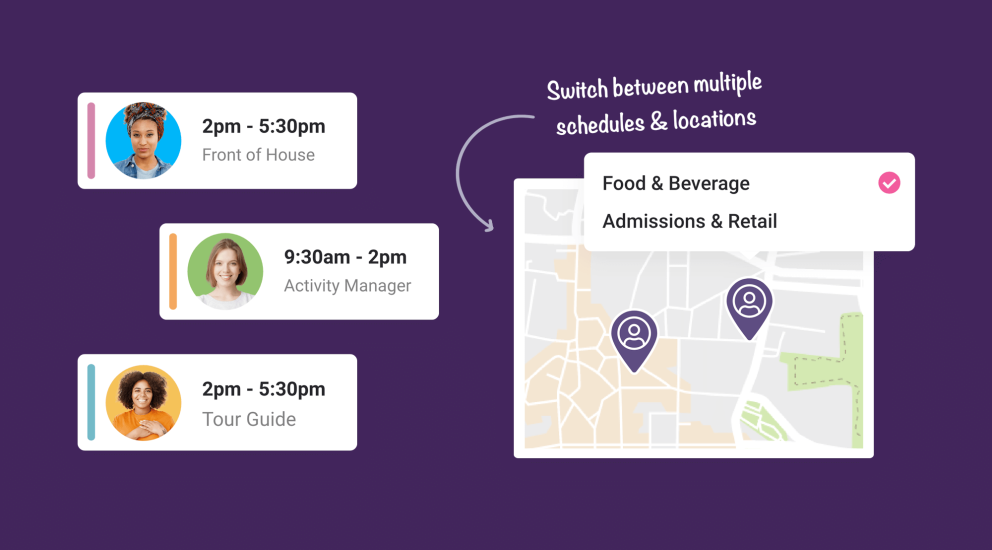Improvement
October 2023 Product Updates
Last updated: 1st October, 2023Bulk Actions On Leave Tab
You can now bulk assign leave approvers and set public holidays on the Leave tab in the Team section, saving you time when managing your employees.
Auto Clock Out For Unscheduled Shifts
Fed up of unscheduled shifts running on for days or weeks when your team forget to clock out of them? Us too; that's why we've introduced a new auto-clock-out setting. Going forward, unscheduled shifts will automatically end after 12 hours if they aren't stopped before, with the timesheet defaulting back to a 1-hour shift, ready for you to edit as required.
September 2023 Product Updates
Last updated: 1st September, 2023Assign Employees To Schedules

You can now assign employees to schedules instead of locations and view multiple locations on the same schedule, giving you more ways of configuring your rotas and making it easier to keep track of your team.
Read MoreShift Reminder Notifications
Are your employees in a perpetual state of amnesia about their shifts? Fear not, we've now added pre-shift reminders that'll make your team's life easier. Now, you can effortlessly schedule shift reminders to grace your employees' inboxes before their shifts begin. Want to give 'em a nudge 15 minutes, 2 hours, or 12 hours ahead of time? We've got you covered on all fronts.
Simply head on over to your settings, click on notifications, and voila, you'll find this option ready and waiting to be set up. Say goodbye to shift no-shows.
August 2023 Product Updates
Last updated: 1st August, 2023GPS Restriction on Clock Out
Any location restrictions you’ve set for clocking in will now apply when your team clock out, too. This helps to prevent employees from clocking out when they’ve already left the site.
Day View Improvements
We’ve updated Day View to make it easier to see what’s going on at a glance. Job role colours now pull through, we’ve added an indicator when viewing ‘today’ to show what time it is currently, and the interface as a whole has been streamlined to make it clearer.
Download Day View CSV
Plagued with a dodgy internet connection? Fear not; you’re now able to download the day view as a CSV to serve as a backup for emergencies.
Time Zone Detection
Say goodbye to frantically Googling timezones; if you have team members who work in different parts of the world from the one you’ve set against your Shiftie account then they’ll be shown the company timezone next to the time clock.
Unscheduled Shift Settings
We've noticed that some staff can get a little confused when seeing unscheduled shift options available, which can affect their timesheets. Unscheduled shifts are your secret weapon for last-minute emergencies when you unexpectedly need to draft an employee into work. When used correctly can be a big help to your business.
To prevent your staff from clocking in for an unscheduled shift when they're already on the rota, we've introduced some additional settings to give you more control. Now, as well as the option to enable or disable unscheduled shifts you can also only allow employees to clock in for an unscheduled shift if they don't already have any shifts scheduled for that day. It's all about giving you the flexibility you need.
June 2023 Product Updates
Last updated: 1st June, 2023Schedule Caching
The system will now remember the day or week you’ve been viewing in the schedule, so if you navigate away and come back it will default to what you were looking at. You can still click the ‘Today’ button to return to the current week, as well.
Colour-Coded Printable Schedule
Job role colour coding will now show when you print your schedule, as well as on the online version.
Time Clock Overrides
Managers can clock employees in and out of their scheduled shifts from the time clock page, making it easier to keep timesheets up to date.
Learn moreMay 2023 Product Updates
Last updated: 1st May, 2023Colour-Coded Job Roles
Job roles now have assigned colours, making it easier than ever to spot them on the schedule. You can update the colours for each job role in your settings, giving you hours of fun getting your colour combinations just right.
Updated DigiTickets Integration
Our DigiTickets integration has had an upgrade; events and sessions will now show on the schedule for each day, letting you really dig into your visitor numbers to make sure you’ve got the right number of staff onsite at every point during the day.
Learn moreSort Day View by Start Time
List shifts in order of when they start during the day, making it easier to check that you’ve got enough coverage at all times.
Timeclock Improvements
View and clock in for upcoming shifts, log unscheduled shifts, and record breaks and end times using the simplified time tracking interface.
Hourly Leave
Add, book, and manage leave in hours as well as days, allowing you to tailor leave allowances to individual employees.
March 2023 Product Updates
Last updated: 1st March, 2023Change Email for Pending Accounts
Amend the email address assigned to pending employees and re-send their invites.
Disable Open Shifts
Don’t want to use open shifts? Not a problem; you can now disable them, freeing up space on your schedule to view your rota.
Enhanced Break Logging
Mark breaks as paid or unpaid, making it easier to keep track of what everyone’s worked and how much they should be paid.

